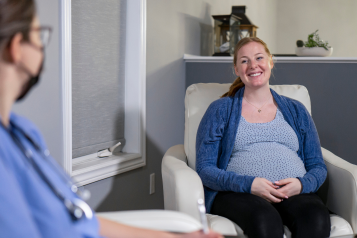'Sometimes it feels like you're entering the last stage of your life' - Lisa's experience of the menopause

Your NHS menopause experience - read our report here.
Lisa says at first, she noticed that her periods were particularly irregular - she was experiencing the odd period, but they would stop for some time and then come back. This went on for about a year.
Before she knew she was going through the menopause, Lisa was experiencing extreme tiredness. Eventually, she found out she had anaemia. She also began suffering with insomnia, hot flushes, weight gain, aching joints, and bladder leakage.
The menopause also had a huge impact on Lisa's emotions. Prior to going through it, all she knew about the menopause was that women could experience hot flushes.
I wasn't enjoying the things I used to - not seeing friends, or enjoying food anymore. I haven't got the energy or motivation to do anything like tidy up around the house. The insomnia makes it worse - I could cry sometimes in the middle of the night.

She was unprepared for the impact the menopause would have on her, and says that prior to going through the menopause, she'd never received any information about it from healthcare professionals.
When she began experiencing symptoms, Lisa thought about going to the GP - but didn't have confidence that she would be helped or taken seriously.
I felt silly going. I've struggled with anxiety in the past and I was afraid they'd just put all my symptoms down to that.
Lisa also has a rare blood disorder, which has resulted in a number of blood clots. Because of this, her GP said she couldn't be prescribed HRT (Hormone Replacement Therapy). Instead, her GP recommended healthy eating and exercise to help with her symptoms.
After several more weeks of struggling with her menopausal symptoms, Lisa went back to the GP, who then referred her to gynaecology department at St Michael's Hospital.
Following a ten and a half month wait, Lisa was offered an appointment at St Michael's. Unlike Lisa's GP, the gynaecologist asked lots of questions about her symptoms. However, due to Lisa's blood disorder, the gynaecologist needed to write to the haematology department before being able to offer Lisa any treatment.
I left feeling really deflated. I'd hoped that I'd be able to get some answers at this appointment. I don't know how long the referral to haematology will take. I understand there's waiting lists and the NHS is still catching up from the pandemic, but the gynaecology department had my medical history and will have known they'd need to speak with haematology. It was really frustrating.
She added: "the menopause can really affect your mental health, especially if your mental health isn't stable. It's affected mine. Symptoms like the sweating are hard to hide and can be really embarrassing.
"Sometimes it feels like you're entering the last stage of your life - like your prime is over and you're not of any use anymore."
In her professional life, Lisa works with people living with dementia.
When I get the foggy brain, sometimes I start to think - have I got dementia? I have to remind myself that it's the menopause. We did a recent activity with people with dementia, showing them 30 words and then asking them how many they could remember. I could only remember 4 out of 30, and I really started panicking. It just reinforced that I need some medication to help with my symptoms.
We'd like to say a huge thank you to Lisa for sharing her story.
If you are perimenopausal, going through the menopause, or post-menopausal, we'd really like to hear your experience of accessing help or support.
You can share your experiences and feedback with us be clicking the pink 'Talk to us' button below.


